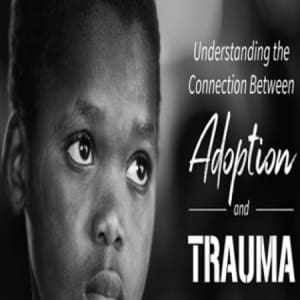
Adoption Trauma: It Can Begin Pre-Birth
$32.00
Adoption trauma can be described as the immense emotional distress associated with being separated from birth families through adoption. Some say this “primal wound” might be a source of trauma. The impact of prenatal stress and preverbal trauma on development is both a topic of education and treatment focus. Children and teens may present with surface-level symptoms related to the effects of prenatal, preverbal, or developmental trauma. While adoption can be a positive experience, some experience psychological trauma regardless of the quality or stability of the family environment. Even once settled with an adoptive family, an adoptee who remembers their biological family may miss them. As children mature, they process their adoption experience through a different cognitive lens. This trauma can result from a variety of experiences, including separation from biological parents, placement into unfamiliar surroundings, and the loss of cultural and familial ties.
Upon completion of this training, participants will be able to:
- Identify core knowledge, values, and skills that characterize an adoption-competent mental health professional.
- Recognize the importance of using positive adoption language.
- Identify and integrate clinical interventions to address the unique mental health needs of children, youth, and their families.
Social workers completing this course receive 2 Clinical asynchronous continuing education credits.
For other board approvals, this course qualifies for 2 hours of Clinical, Evidence-Based Practices, and General Skill Building continuing education training.
Course Instructor: Tonya Logan, LCSW
Recording Date: 4/25/2024
Recorded Live Webinar with downloadable presentation slides and/or handouts, evaluation, and a required quiz. The learner is required to pass with a 70% or higher to achieve the CE certificate of completion. The learner is able to reset the test until a satisfactory score is achieved. CE Training Workshops, LLC, provider #1770, is approved as an ACE provider to offer social work continuing education by the Association of Social Work Boards (ASWB) Approved Continuing Education (ACE) program. Regulatory boards are the final authority on courses accepted for continuing education credit. ACE provider approval period: 8/2/2022 – 8/2/2025. CE Training Workshops, LLC has been approved by NBCC as an Approved Continuing Education Provider, ACEP No. 7091. Programs that do not qualify for NBCC credit are clearly identified. CE Training Workshops, LLC is solely responsible for all aspects of the programs. System Requirements: Firefox, Chrome, Brave, Safari, Edge on any modern operating system (Windows, MacOS, Linux, Android, iOS). A desktop browser is recommended. We do not provide support resources for issues encountered using a mobile device. For more information about our policies and board approval statements, please visit our FAQS page.
Tonya M. Logan, LICSW and LCSW-C, has over 30 years of professional clinical experience working with those managing conflict and trauma. She holds a Masters Degree from the University of Maryland at Baltimore.
Adoption Trauma: It Can Begin Pre-Birth (2 HR) Syllabus
I. Developmental Trauma Disorder and Early Impacts
- Criteria for Developmental Trauma Disorder
- Functional impairments in emotional, cognitive, and relational domains
- Impacts of trauma, grief, and loss on brain and behavior
II. Neurology and Early Attachment
- Effects of feeling safe on nervous system development
- Influence of prenatal and perinatal health issues
- Formation of neurological pathways based on early experiences
III. Developmental Stages and Trauma
- Birth to two years: tasks of identity, connection, and exploration
- Trauma impact on communication, exploration, and memory
- Pre-verbal trauma and lasting emotional triggers
IV. Attachment Challenges
- Behavioral signs of attachment difficulties
- Internalized beliefs formed through disrupted attachment
- Effects on sensory integration, social development, and emotional regulation
V. Approaches to Building Healthy Attachment
- Balancing structure and nurturing
- Importance of therapeutic parenting techniques
- Attunement: emotional connection through accurate interpretation and response
VI. Intentional and Therapeutic Parenting
- Developing purposeful parenting plans
- Maintaining a long-term perspective and practicing caregiver self-care
- Recognizing the slow healing process for traumatized children
VII. Clinical Implications for Child and Family
- Importance of early intervention to support brain repair
- Differences in behavior origins requiring specialized responses
- Risk factors associated with multiple placements and disruptions
VIII. Positive Adoption Language
- Shifting from negative to positive language in adoption conversations
- Examples of appropriate terms to foster dignity and respect
IX. Therapeutic Issues in Adoption
- Open versus closed adoptions and associated challenges
- Managing experiences of separation, loss, and multiple placements
- Supporting sibling relationships and engagement with birth families
X. Addressing Post-Adoption Challenges
- Understanding post-adoption blues and grief
- Strategies for honoring birth families in open and closed adoptions
- Helping children maintain connections with their cultural and familial roots
XI. Adoption Stories and Cultural Reflections
- Stories of notable adoptees and the role of adoption in shaping identity
- Normalizing complex emotions surrounding adoption experiences
XII. Key Considerations for Supporting Adopted Children
- Importance of helping children understand their life stories
- Continuous revisiting of life experiences through developmental stages
- Empowering appropriate emotional expression and behavioral understanding


